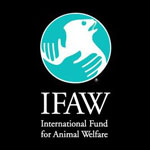
Top stories


Marketing & MediaAI changed how I work as a designer, faster than I expected
Emmanuel Naidoo, Ignition Group 4 hours




More news









ESG & Sustainability
Can Ramaphosa’s crisis committee solve South Africa’s water woes?



















"International organised criminal syndicates are wiping out the world's animals. NGOs, law-enforcement agencies and governments have to become equally organised, determined and equipped in dealing with this emerging and growing threat, which impacts on species conservation and international security," said Azzedine Downes, IFAW's CEO and president.
"IFAW's relationship with Interpol began in 2005 and has continued to grow over the years on the basis of shared goals, trust, mutual respect and responsibility. Today's signing is a deepening of that relationship and reflects the complementary expertise that IFAW and Interpol bring to the table."
"This agreement with IFAW will provide further momentum to efforts worldwide in identifying and dismantling the criminal organisations engaged in wildlife trafficking," said Interpol's executive director of police services, Jean-Michel Louboutin, who signed the MoU on behalf of the world police body.
"Criminal organisations engaged in wildlife trafficking have no respect for our environment and no regard for borders, conducting their illicit activities wherever there is the most profit to be made.
IFAW and Interpol have collaborated on numerous projects since 2005, including the Interpol's largest-ever international illegal ivory trade operation, which occurred in 2012 and was called Operation Worthy.
IFAW and Interpol have also collaborated on investigating the illegal trade in wildlife on the Internet with numerous reports including the most recent Project Web report.
"I am confident that this strategic partnership between IFAW and Interpol will enable us to undertake more intelligence-led policing to identify better the links between illegal wildlife trade and the global networks driving and facilitating wildlife crime, better trained police and other law enforcers in the field, more criminals in jail and ultimately more animals in the wild. This partnership can serve as a model for trust and co-operation between other NGOs, international organisations and governments. Ultimately, we cannot stop wildlife trafficking without international collaboration at the highest level.
"Tackling the global problem of wildlife crime cannot be done by any one country or organisation and we look forward to continuing to work closely with the IFAW to provide additional support to the police and other enforcers in the field," added Louboutin.
Future projects with Interpol include forthcoming training for officials in Mozambique this June.